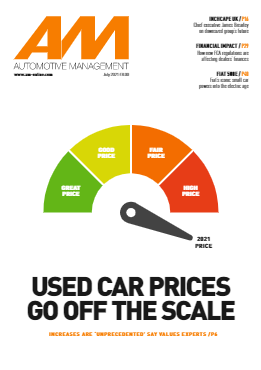Car retailers will be locked into a strategy of “retaining profit margins at all cost” as vehicle supply issues continue into 2022, according to Cox Automotive.
Philip Nothard, the automotive services supplier’s insight and strategy director, has said limited supplies of key components – including semiconductors, aluminium, and rubber – will continue until the end of this year, causing new vehicle deliveries to be impacted in 2022.
And as new stock limitations continue, so will the lofty wholesale used car prices resulting from buoyant consumer demand and their shift to pre-owned car purchases.
“We don't expect the full financial repercussions of the tier one supply chain issues to hit until the fourth quarter of 2021, and they certainly won't be fully resolved until 2022,” said Nothard.
He added: “New car registrations continue to face challenges because of supply chain constraints.
“Although May ended with a 674.1% (156,737) increase compared to 2020 (20,247), this is a misleading picture due to the severity of the first lockdown last year.
“The more telling comparison is with May 2000 – 2019 averages (176,493), which shows the current market as being 11.2% down.”
- In the new, July edition of AM magazine car valuations experts and used car buyers told AM that “once in a lifetime” used car price rises had prompted them to throw the rule-book “out of the window”. Read our News Insight report here.
Nothard highlighted Cox Automotive data which demonstrated the impact of increased demand for used car stock in his mid-moth review of the sector.
He said that first-time conversions on its remarketing platforms were above 80% and average wholesale sold prices remained at pre-pandemic levels (currently £5,801).
Nothard said retailers were adjusting stock profiles and focusing on retaining profit margins as part of their efforts to mitigate against their stock sourcing challenges.
He said: “The lack of quality stock is causing many dealers to readjust their focus towards retaining profit margins at all cost.
“For as long as demand for quality retail vehicles still exists, dealers will continue to purchase vehicles outside of their usual stock profile to ensure their forecourts remain full.
“This has caused both average wholesale age (102.3 months, +4.9% MoM) and mileage (69,011, +5% MoM) to increase even further.”
AM reported yesterday (June 17) that automotive retail sales consultant Andrew Banning’s assertion that franchised car retailers and their manufacturer partners risk losing the battle for the used car market as emerging online disruptors assert dominance in stock acquisition.
Banning said the market’s issues have more to do with increased competition from the likes of Cazoo, cinch and Carzam than a shortage of vehicles to fill retail forecourts.
“Online independent used car retailers have grasped that if you control access to used car stock then you control access to both used car customers and the market,” he said.



















Login to comment
Comments
No comments have been made yet.